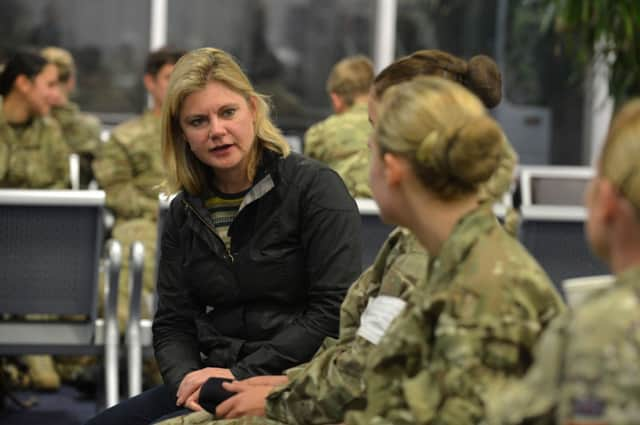Justine Greening joins army medics on Ebola mission


The minister flew from RAF Brize Norton yesterday with around 100 soldiers from the Royal Army Medical Corps.
The UK is leading the international response to the disease in the country, and has pledged £125 million of aid, including support for 700 treatment beds.
Advertisement
Hide AdAdvertisement
Hide AdThe medics who deployed yesterday are from Catterick-based 35 Squadron, 5 Armoured Medical Regiment and Royal Army Medical Corps. They will staff an Ebola training academy alongside around 90 personnel from 22 Field Hospital who left for Sierra Leone last week.
Ms Greening will visit the academy, as well as the site of a 92-bed treatment facility in the final stages of construction.
She said: “Halting the disease in West Africa is the most effective way of preventing Ebola infecting people here in the UK.
“That is why we are providing 700 treatment beds, sending supplies such as chlorine and protective clothing, and training hundreds of health workers.
“I look forward to seeing for myself how British Army medics and engineers, as well as our humanitarian and health workers, are spearheading the UK’s efforts to contain and ultimately defeat Ebola.”
Ms Greening’s visit comes as researchers claimed that an estimated three travellers infected with Ebola could be taking international flights from West Africa every month if screening was not in place at airports.
A Canadian team based the conclusion on an analysis of World Health Organisation (WHO) data and flight records relating to hundreds of thousands of passenger trips out of Guinea, Liberia and Sierra Leone.
The study found that without exit screening, on average just under three (2.8) people infected with the deadly virus would be expected to travel on an international flight from any one of the countries’ international airports each month.
Advertisement
Hide AdAdvertisement
Hide AdAirport screening is currently in force at Conakry, capital of Guinea, Monrovia, capital of Liberia, and Freetown, capital of Sierra Leone. However, the findings are said to highlight the importance of preventing the global spread of Ebola at source.
Guinea, Liberia and Sierra Leone are the African countries still firmly in the grip of Ebola. As of 14 October, WHO had received reports of 9,216 confirmed, probable and suspected cases in five African countries, plus Spain and the US. There have been 4,555 deaths.
Nigeria and Senegal have now been declared Ebola-free.
Lead researcher Dr Kamran Khan said: “Exit screening at the international airports in Guinea, Liberia and Sierra Leone should allow all travellers at highest risk to be assessed with greater efficiency compared with entry screening.”
Of about 500,000 travellers who flew out of Guinea, Liberia or Sierra Leone in 2013, more than half were bound for four countries – Ghana, Senegal, the UK and France .
UK border screening expanded
Screening for Ebola at Gatwick Airport began yesterday, Public Health England (PHE) said. It will be followed by checks at St Pancras, the Eurostar rail terminal, later this week.
The screening is of passengers identified as having travelled from Sierra Leone, Guinea and Liberia.
A PHE spokesman said: “This expands the screening initiated at Heathrow last week, which is going well. Manchester and Birmingham airports will follow.
“Screening is being undertaken to help ensure individuals arriving from high-risk areas know what to do if they start feeling ill, and can receive expert advice. We are also providing all general practices, emergency departments and pharmacies in England with awareness posters.”